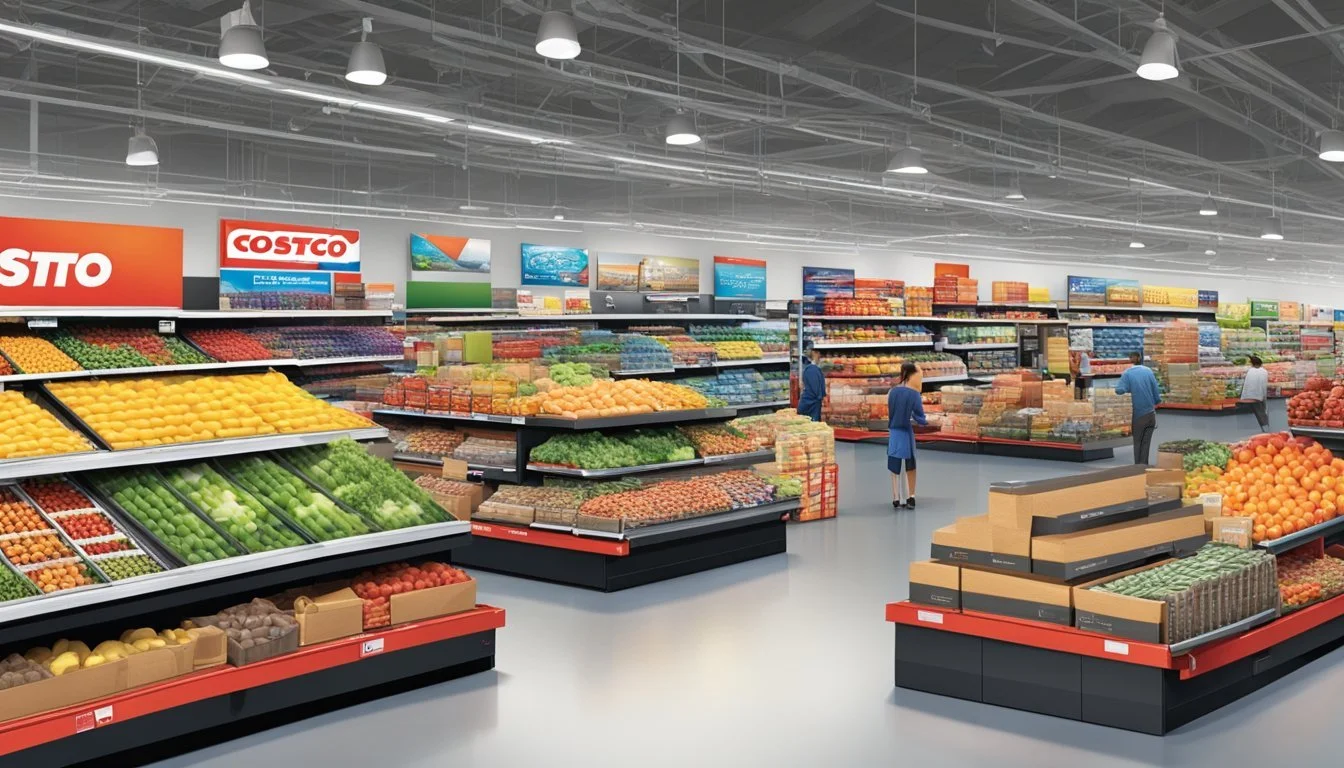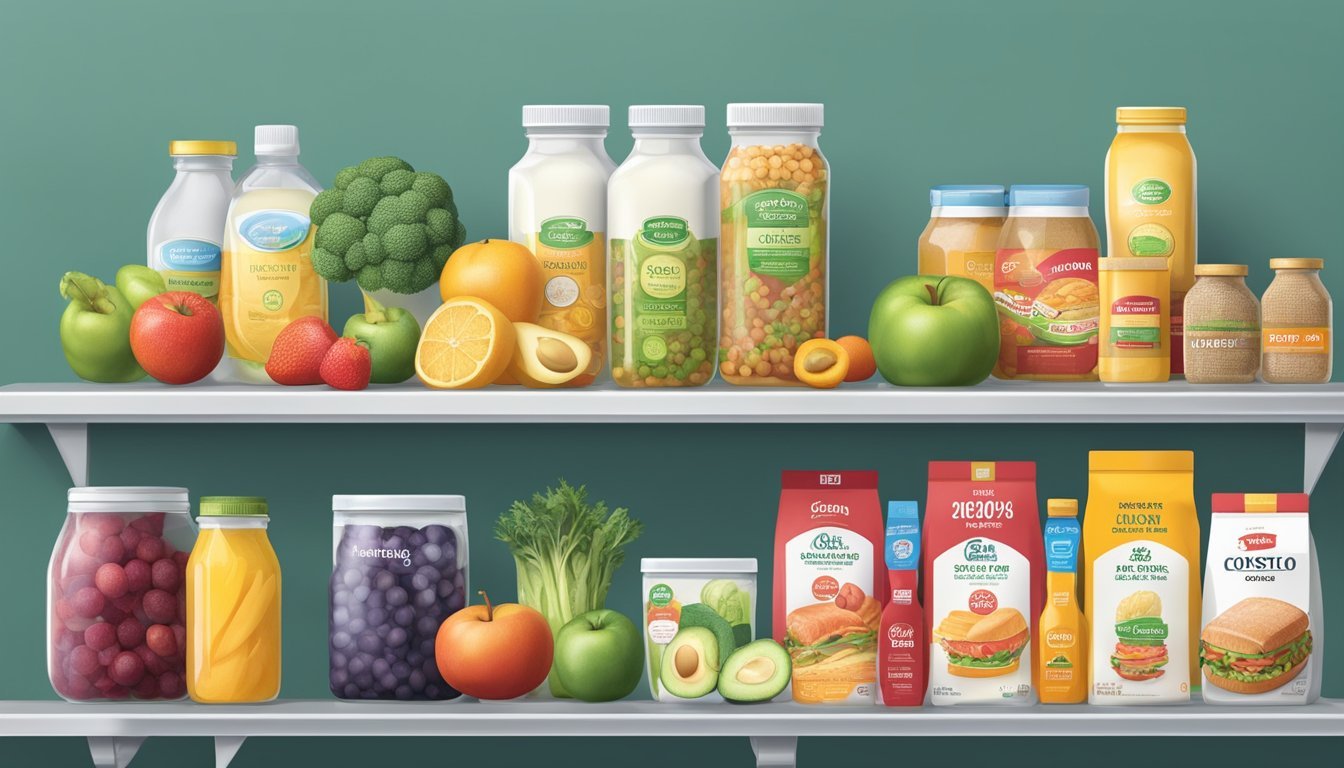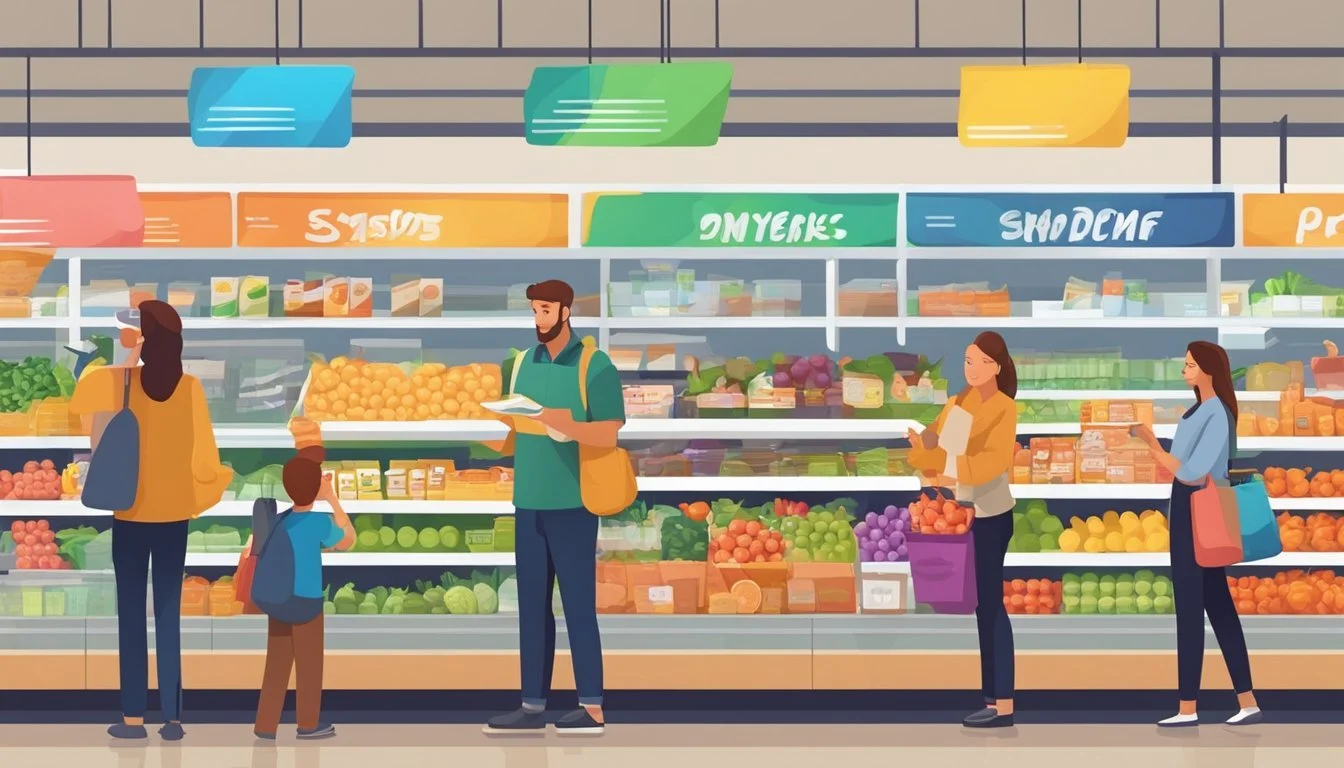Target vs Costco
A Comprehensive Comparison of Retail Giants
Target and Costco are two retail giants that offer a wide range of grocery items, but they cater to different shopping needs and preferences. While both stores have their strengths, they differ significantly in pricing strategies, product selection, and shopping experiences.
For overall grocery savings, Costco tends to offer lower prices on many items compared to Target, especially when buying in bulk. However, Target often provides better deals on smaller quantities and frequently-purchased household essentials. This makes Target more suitable for shoppers who prefer regular small trips, while Costco appeals to those who stock up less frequently.
Product quality and variety also play a role in the comparison. Costco is known for its high-quality Kirkland Signature brand and bulk packaging, whereas Target offers a mix of name brands and its own labels in more standard sizes. The choice between these two retail giants ultimately depends on individual shopping habits, storage space, and specific product needs.
Overview of Costco and Target
Costco and Target stand as retail giants in the United States, each with distinct approaches to serving customers. These companies have shaped the retail landscape through their unique business models and market strategies.
History and Business Models
Costco began operations in 1983, pioneering the membership warehouse club concept. The company focuses on bulk sales of a limited selection of products at discounted prices. Costco's business model revolves around high-volume sales and low markups, relying heavily on membership fees for profitability.
Target, founded in 1902, evolved into a discount retailer in the 1960s. The company positions itself as an upscale discounter, offering a wide range of products including clothing, home goods, and groceries. Target emphasizes design and affordability, aiming to provide a more curated shopping experience compared to other discount retailers.
Market Presence and Consumer Base
Costco operates over 800 warehouses worldwide, with a strong presence in the United States and expanding international footprint. The company attracts middle to upper-income consumers willing to pay annual membership fees for access to bulk savings. Costco's customer base often includes families, small businesses, and value-conscious shoppers.
Target boasts nearly 2,000 stores across the United States. The retailer appeals to a diverse demographic, particularly younger, urban, and design-conscious consumers. Target's "expect more, pay less" philosophy resonates with shoppers seeking affordable yet stylish products.
Both companies face competition from retail giants like Walmart and Amazon. Costco's membership model and bulk offerings provide a unique value proposition. Target differentiates itself through its focus on design and exclusive brand partnerships.
Membership and Pricing Structures
Costco and Target employ distinct approaches to membership and pricing. While Costco requires a paid membership for access to its warehouse stores, Target operates as a traditional retailer open to all shoppers.
Costco Membership Benefits and Fees
Costco offers two membership tiers: Gold Star and Executive. Gold Star membership costs $60 annually and grants access to all Costco warehouses worldwide. Executive membership, priced at $120 per year, includes additional perks.
Executive members earn 2% cashback on eligible Costco purchases, up to $1,000 annually. They also receive exclusive offers and discounts on Costco services like travel packages and insurance.
Both membership levels include a free household card and access to Costco gas stations. The renewal rate for Costco memberships is high, with many members finding the annual fee worthwhile due to potential savings.
Target Pricing Strategies
Target does not require a membership fee to shop at its stores. Instead, it employs various pricing strategies to attract and retain customers.
The retailer offers a free loyalty program called Target Circle. Members earn 1% cashback on purchases and receive personalized deals and discounts.
Target's REDcard, available as a debit or credit card, provides a 5% discount on most purchases. Cardholders also enjoy free shipping on online orders and extended return periods.
The company frequently runs promotions and sales events. Its price matching policy allows customers to request a price adjustment if they find a lower price at select competitors, including Costco.
Product Range and Quality
Target and Costco offer distinct product selections, with each store having unique strengths in their offerings and quality standards. Both retailers provide exclusive brands and bulk options, while maintaining high standards for produce and essential items.
Exclusive Brands and Bulk Items
Costco's Kirkland Signature brand is renowned for its quality and value. This private label covers a wide range of products, from groceries to clothing. Costco specializes in bulk items, perfect for large families or those who prefer to stock up.
Target's store brands include Up & Up, Good & Gather, and Cat & Jack. These brands offer affordable alternatives across various categories. Target focuses on curated selections rather than bulk quantities.
Quality of Produce and Essentials
Costco's produce section is known for its freshness and competitive pricing. The store often sources locally when possible. Costco's strict quality control ensures that essentials meet high standards.
Target's produce quality varies by location but generally maintains good standards. The retailer has improved its fresh food offerings in recent years. Target excels in providing a wide range of essential items at competitive prices.
Both stores prioritize quality, but Costco's bulk model may lead to fresher produce due to higher turnover rates. Target's smaller quantities can be advantageous for those with limited storage space.
Shopping Experience and Services
Target and Costco offer distinct shopping experiences and services tailored to different consumer needs. Both retailers have unique advantages in their in-store layouts, online platforms, and additional offerings.
In-Store Experience
Target stores feature bright, well-organized aisles with clearly labeled sections. The retailer focuses on creating an inviting atmosphere with wide walkways and visually appealing displays. Target's layout encourages browsing, with strategically placed bargain sections like "Bullseye's Playground" near the entrance.
Costco's warehouse-style stores have a no-frills approach. The retailer emphasizes bulk purchases and frequently rotates inventory. Aisles are wider to accommodate larger carts and pallets of merchandise. Costco often surprises shoppers with limited-time deals on electronics, home goods, and seasonal items.
Both stores offer self-checkout options, but Target typically has more registers open for faster service.
Online Shopping and E-commerce Capabilities
Target's e-commerce platform is robust and user-friendly. The Target app integrates seamlessly with the website, offering features like:
Drive-up and in-store pickup options
Same-day delivery through Shipt
Detailed product information and customer reviews
Personalized recommendations based on shopping history
Costco's online presence has improved significantly. The Costco app provides:
Access to warehouse savings and exclusive online deals
Easy reordering of previous purchases
Digital membership card for in-store shopping
Both retailers offer competitive shipping rates and times for online orders.
Additional Services Offered
Target provides several convenient services:
Starbucks cafes in many locations
CVS pharmacies in select stores
Target Circle loyalty program with cashback rewards
REDcard credit and debit cards for additional savings
Costco offers unique member benefits:
Discounted gas prices at Costco fuel stations
Affordable food court options
Travel services and car rental discounts
Extended warranties on electronics and appliances
Optical centers and hearing aid services
Both retailers prioritize customer privacy and have detailed privacy policies governing data collection and use.
Customer Perks and Incentives
Both Target and Costco offer attractive perks to entice and retain loyal shoppers. These incentives range from rewards programs to exclusive deals that can lead to significant savings over time.
Loyalty Programs and Dividends
Target's REDcard provides a 5% discount on most purchases, free shipping for online orders, and extended return periods. This credit or debit card option comes with no annual fee. Costco's membership structure offers two tiers: Gold Star and Executive. The Executive membership, priced at $120 annually, includes a 2% reward on eligible Costco purchases, capped at $1,000 per year.
Costco's unique approach includes an annual dividend for Executive members based on their spending. This cash-back reward can offset the membership fee for frequent shoppers. The warehouse club boasts a high membership renewal rate, indicating strong customer satisfaction with its perks.
Exclusive Deals and Savings
Target frequently runs promotions through its Circle rewards program, offering personalized coupons and cashback opportunities. The retailer's weekly ad features rotating discounts across various departments. Target's limited-time designer collaborations generate excitement and provide access to high-end brands at affordable prices.
Costco's buying power allows for deep discounts on bulk items. The retailer offers exclusive member-only savings events throughout the year. Costco's Kirkland Signature brand provides quality products at competitive prices. Members also gain access to discounted services like travel packages, insurance, and vehicle purchases.
Both stores leverage their private label brands to offer additional savings. Target's Good & Gather and Up & Up lines compete with national brands on quality and price. Costco's Kirkland Signature products span a wide range of categories, often matching or exceeding the quality of name-brand alternatives.
Private Labels and Exclusive Products
Target and Costco both offer unique private label products that provide quality and value. These store brands allow customers to save money while still getting reliable goods.
Costco's Kirkland Signature Line
Kirkland Signature is Costco's flagship private label brand. It covers a wide range of products, from food and beverages to household essentials. Kirkland Signature items often match or exceed the quality of national brands at lower prices.
Costco's private label includes popular items like:
Kirkland Signature paper towels
Kirkland Signature beauty products
Kirkland Signature personal care items
Many Kirkland products are made by the same manufacturers as leading national brands. This allows Costco to offer similar quality at reduced prices.
Target's Exclusive Brand Assortment
Target has developed a diverse portfolio of in-house brands. These exclusive labels cover various categories, including groceries, home goods, and apparel.
Some of Target's popular private label brands include:
Good & Gather (food and beverages)
Up & Up (household essentials)
Threshold (home decor)
Target's store brands focus on style and affordability. They aim to provide trendy options at competitive prices compared to national brands.
Target frequently introduces new private label lines to stay current with consumer trends. This strategy helps Target differentiate itself from competitors and attract budget-conscious shoppers.
Strategic Partnerships and Market Expansion
Target and Costco have pursued different strategies for growth and market expansion. Target has focused on strategic partnerships to enhance its offerings and reach new customers.
In 2019, Target formed a partnership with Disney to open Disney stores within select Target locations. This collaboration allows Target to attract more families and Disney fans to its stores.
Target has also partnered with popular brands like Levi's, Apple, and Ulta Beauty to create shop-in-shop experiences. These partnerships help Target differentiate itself and provide a more upscale shopping environment.
Costco has taken a different approach, focusing on organic growth and international expansion. The company has steadily opened new warehouse locations in the U.S. and abroad.
Costco has expanded into countries like Japan, South Korea, and Australia. This international growth has helped Costco tap into new markets and increase its global presence.
While Costco hasn't pursued as many high-profile partnerships, it has maintained strong relationships with suppliers. These relationships allow Costco to offer competitive prices on quality products.
Both retailers have also invested in e-commerce capabilities. Target acquired Shipt in 2017 to improve its same-day delivery services. Costco has partnered with Instacart for grocery delivery in some markets.
Impact of Economic Trends
Economic shifts have significantly influenced shopping behaviors at Target and Costco. Consumer priorities and spending patterns have adapted to new financial realities, reshaping the competitive landscape between these retail giants.
Pandemic and Post-Pandemic Consumer Behavior
The pandemic dramatically altered shopping habits. Consumers prioritized bulk buying and essential goods, benefiting Costco's warehouse model. Target expanded its digital capabilities, meeting the surge in online shopping demand.
Post-pandemic, both retailers have maintained some pandemic-era changes. Target's same-day services remain popular, while Costco has seen continued strong membership growth.
Shoppers now value flexibility and convenience more than ever. Target's diverse store formats cater to various shopping needs, from quick trips to larger hauls.
Inflation and Consumer Spending
Rising inflation has intensified price sensitivity among shoppers. Costco's low-price strategy has attracted budget-conscious consumers seeking to stretch their dollars.
Target has responded by emphasizing value, expanding its private-label offerings, and increasing promotions. Both retailers have invested in their private brands to provide affordable alternatives.
Consumer spending patterns have shifted towards essentials. Costco's focus on groceries and household items aligns well with this trend. Target has adapted by allocating more floor space to food and beverage categories.
Data shows shoppers spending less time in Target stores but lingering longer in Costco, indicating different value perceptions and shopping missions between the two retailers.
Social Responsibility and Consumer Trust
Target and Costco both prioritize social responsibility and consumer trust. These factors play a crucial role in shaping customer perceptions and loyalty.
Target emphasizes sustainability initiatives, including waste reduction and eco-friendly product offerings. The company has set ambitious goals to reduce its environmental impact and promote ethical sourcing practices.
Costco focuses on fair labor practices and employee welfare. The warehouse retailer is known for providing competitive wages and benefits, fostering a positive work environment.
Both companies have implemented robust privacy policies to protect customer data. They use cookies to enhance user experience while maintaining transparency about data collection practices.
Target's privacy policy outlines:
Data collection methods
Information usage
Consumer rights
Costco's approach includes:
Secure payment systems
Limited data sharing
Clear opt-out options
Customer trust is built through consistent quality and value. Target offers a mix of affordable and premium products, catering to diverse consumer needs. Costco's bulk purchasing model provides significant savings to members.
Social responsibility initiatives extend to community involvement. Both retailers support local charities and engage in philanthropic activities, strengthening their reputation as socially conscious businesses.
Conclusion
Target and Costco both offer unique shopping experiences and value propositions. Costco excels in bulk purchases and exclusive member benefits, while Target provides a wider range of products and a more frequent shopping destination.
Consumer satisfaction remains high for both retailers. Costco's loyal membership base appreciates its quality products and competitive pricing. Target's customers value its trendy offerings and convenient locations.
Market trends indicate a shift towards omnichannel retail experiences. Both companies have invested in their digital platforms to meet evolving consumer demands.
The future outlook for these retailers appears positive. Costco continues to expand its warehouse locations and e-commerce capabilities. Target focuses on enhancing its same-day delivery services and store renovations.
Ultimately, the choice between Costco and Target depends on individual shopping habits and preferences. Budget-conscious consumers who buy in bulk may prefer Costco, while those seeking variety and style might lean towards Target.
Both retailers have demonstrated resilience and adaptability in a competitive market. Their distinct strategies position them well for continued success in the ever-changing retail landscape.









